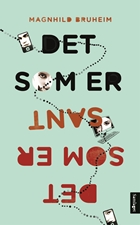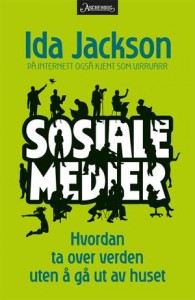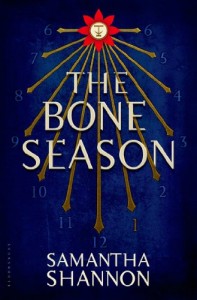 Jeg har lest The Bone Season på engelsk, men velger å bryte mine egne regler og skrive om den på norsk, siden jeg har tenkt å lenke til og sitere fra noen anmeldelser og et intervju på norsk og dessuten har en kopi av den norske utgaven, Drømmegjengeren, å gi bort til en heldig leser.
Jeg har lest The Bone Season på engelsk, men velger å bryte mine egne regler og skrive om den på norsk, siden jeg har tenkt å lenke til og sitere fra noen anmeldelser og et intervju på norsk og dessuten har en kopi av den norske utgaven, Drømmegjengeren, å gi bort til en heldig leser.
Samantha Shannons debutroman er blitt såpass hypet at jeg i normale tilfeller nok hadde droppet å lese den med det første, fallhøyden blir stor når en bok får så mye oppmerksomhet. Siden jeg som nevnt tidligere i et anfall av postbokfestivalentusiasme takket ja til å få den norske oversettelsen fra forlaget måtte jeg jo nesten lese boka også. Og å si at jeg ikke var litt nysgjerrig ville være løgn.
Så, ja.
Kort fortalt: Paige Mahoney er en klarsynt 19-åring i år 259 i et totalitært Storbritannia der Scion styrer og klarsynthet betraktes som en epidemisk sykdom som må utryddes, fortrinnsvis ved å henrette alle klarsynte. Det er 200 år siden vår verden og Shannons fiktive verden skilte lag, og Paiges London er preget av mye av det vi kjenner fra viktoriatiden, siden teknikken har gått framover på andre punkter i hennes verden enn i vår. Siden hun aldri ville blitt godtatt i samfunnet uansett har Paige valgt en kriminell karriere, og er en del av et kartell av klarsynte i Londons underverden. Paiges sjef, Jaxon, har stor tro på at Paiges evner er sterkere enn hun så langt har vist, og det viser seg etter hvert at han har rett. Hun oppdager nye dimensjoner ved evnene når hun havner i fare på t-banen, men nettopp denne situasjonen fører også til at hun blir oppdaget av myndighetene og arrestert. Hun blir fraktet sammen med andre fanger til Oxford, som det viser seg har vært et skjult samfunn siden 1859 når underjordiske vesener, kalt Refaitter, med sterkere tilknytninger til eteren enn selv de klarsynte gjorde en avtale med myndighetene om å beskytte menneskene fra eterens angivelige farer. I Oxford lærer Paige mer om egne evner og knytter nye allianser, men det er like fullt en fangeleir og mye av fokuset hennes ligger på å rømme og komme seg tilbake til «familien», hennes gjeng i kartellet.
Og det er jo ikke dårlig, dette. Paige er en ganske spennende hovedrollefigur, universet Shannon har skapt er gjennomarbeidet og komplekst, og som uhelbredelig anglofil er jeg fascinert av hennes London og Oxford. At det finnes ekko fra viktoriatiden gir boka et visst preg av steampunk, noe som ikke er negativt. Knytningen til irsk historie er også interessant, og jeg håper den tråden tas opp bredere i framtidige bøker.
No matter how much I sometimes wanted it, there was no normal. There never had been. ‘Normal’ and ‘natural’ were the biggest lies we’d ever created. We humans with our little minds. And maybe being normal wouldn’t suit me.
Men. Jeg vet ikke. Jeg blir ikke ordentlig grepet. Når jeg hadde kommet 25 % gjennom boka (sånn er det på Kindle, man tenker i prosent, ikke sider) vurderte jeg alvorlig å gi opp helt. Først når jeg var på over 80 % var det sånn at jeg leste videre fordi jeg virkelig ville vite hva som kom til å skje snarere enn fordi jeg følte jeg burde, men selv da ble det aldri sånn at jeg ikke kunne legge fra meg boka. Og det holder faktisk ikke. Når Shannon sier i intervjuer at hun har planlagt at det skal bli sju bøker kan jeg ikke si jeg blir hoppende glad, akkurat.
Både Bokelskerinnen og Knirk har pekt på ting som jeg også hang meg opp i, men jeg skal forsøke å sette egne ord på hva som gjør at The Bone Season ikke helt når opp til forventningene.
Universet Shannon har skapt er riktignok gjennomarbeidet, men jeg er ikke helt overbevist om at boka er det. Det er mye ‘tell’ i stedet for ‘show’ i boka og kanskje er universet unødvendig komplekst? Det blir i alle fall mye å holde rede på, og det hadde ikke vært noe problem om boka ellers grep meg, men det blir så mye Shannon må få forklart for at vi skal forstå hva som foregår at det går ut over handlingen. Av de 400+ sidene er det mye som bare er forklaring av hvordan ting henger sammenog enda mer som virker som det er med fordi det forklarer noe om universet snarere enn fordi det skal drive historien framover. Det er ikke uvanlig innenfor sjangeren fantasy/sci-fi, særlig ikke i første bok i en tenkt serie, men det er ikke dermed sagt at det er en god ting. Samtidig er dette det punktet som får meg til å tenke at jeg nok kommer til å gi Shannon en sjanse til og lese bok nummer to, for forhåpentligvis har hun fått unna det verste av forklaring i bok en og kan fokusere på historien i bok to.
Kanskje.
Ellers må jeg vel si at jeg er så lei historier om såkalt klarsynte, spøkelser og andre «eteriske» fenomener i vår verden at irritasjonen min smitter over på The Bone Season. Det er litt urettferdig, kanskje, for i Shannons fiktive univers er klarsynthet og eter legitime handlingsdrivere og jeg har ikke inntrykk av at Shannon på noen som helst måte mener at det finnes klarsynte i vår verden av den grunn. Men irritert blir jeg i alle fall.
Jeg fikk også en litt uggen følelse rundt «the love interest», altså kjærlighetshistorien oppi det hele. Jeg klarte først ikke helt å definere hvorfor, annet enn at det på en eller annen måte virket umodent (til sammenligning virker J. K. Rowlings beskrivelse av tenåringsforelskelse i Harry Potter moden, siden sammenligningen til Rowling – til Shannons fortvilelse, det skal sies – er dratt). Nå er jo Shannon bare 21, så det er kanskje ikke så rart, men siden boka er utgitt som voksenbok må man få lov til å vente seg noe mer. Knirk setter fingeren på noen av de tingene som både tyder på manglende modenhet og på en langt mer tvilsom klisje i litteraturens kjærlighetshistorier, men vær klar over at detaljene her er spoilers, så ikke klikk deg inn om du ikke vil ha avsløringer, jeg lar være å utdype.
Refaittene er i seg selv et problem for meg, du kan si jeg har litt det samme problemet med dem som med vampyrer. Shannon sier til Bokelskerinnen: «Jeg hadde en ide om å skape en rase som så ut som det menneskene gjorde før syndefallet. Mer perfekte, høyere og sterkere. » Og, ja, er det bare jeg som får litt glitrende, tusen år gammel vampyr-vibe av dette? Som fiender er de en ting, som allierte eller venner? Altså, jeg vet ikke.
Jeg savnet også humor. Det er det nemlig fint lite av. Shannon sier selv, også til Bokelskerinnen: «jeg har heller ikke J.K. Rowlings vidunderlige sans for humor», og nei, det har hun ikke. Men hun har også rett i at det ikke finnes noen god grunn til at vi skal sammenligne henne med Rowling (kvinner som skriver fantasy og utgis av Bloomsbury. Joda, jeg ser hvordan pressen vil hoppe på sammenligningen), og at hennes bok er mørkere (mørkere enn Deathly Hallows? Vel, jeg er ikke så sikker). Men det betyr ikke at man ikke kan savne lysglimtene. Lær av Shakespeare, sier jeg, selv tragediene har humor innimellom, det er kjent som «comic relief».
Jeg skal utdype en annen sammenligning med Harry Potter, siden vi først er inne på det. Ikke fordi det er noen grunn til at Shannons bok skal ligne Rowlings, men fordi Harry Potter er et godt eksempel på noe annet jeg savnet i The Bone Season, nemlig vennskap, fellesskap og (selvvalgt) familie. Gjennom mesteparten av boka er det Paige mot verden som rår, og at boka er fortalt i jeg-form er med på å understreke dette. Mot slutten ser jeg riktignok konturene av noe som kan bli til noe i neste bok, men gjennom bok en er Paige for det første stort sett adskilt fra det hun har av «familie» og det som kommer fram rundt denne «familien» er ikke av en slik art at jeg nødvendigvis føler at de var noe tap. Så får vi se hvordan det utvikler seg.
Den norske oversettelsen av Kjersti Velsand later til å være helt ok. Jeg har bladd litt her og der og sammenlignet noen av sitatene jeg har markert på engelsk med den norske versjonen. Noen steder taper språket noe av fargen sin som i denne beskrivelsen av en av Claires «kolleger»:
Danica. Our resident genius, second only to Jax in intellect. She was three years older than me and had all the charm and sensitivity of a sucker punch. Nick classified her as a sociopath when she was first employed. Jax said it was just her personality.
På norsk har det blitt til:
Danica. Vårt eget lokale geni, intellektuelt bare forbigått av Jax. Hun var tre år eldre enn meg, fullstendig blottet for sjarm og empati. Nick betegnet henne som sosiopat da hun ble ansatt. Jax sa det bare var personligheten hennes.
Det er bare ikke samme schwungen over «fullstendig blottet for sjarm og empati» som «had all the charm and sensitivity of a sucker punch». Samtidig ser jeg jo at det ikke er så lett å finne en norsk variant som funker. Og hadde jeg ikke sittet og sammenlignet setning for setning hadde jeg neppe savnet noe heller. Noe annet er at jeg også synes språkflyten virker litt hakkete innimellom, men så er heller ikke språket i orginalen blottet for feil.
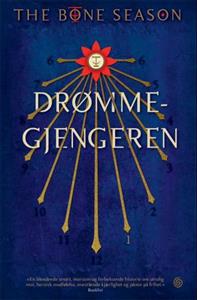 Det er mulig jeg har vært så negativ at du har bestemt deg for å la være å lese boka, men om du har lyst til å gjøre opp din egen mening og vil lese boka i norsk oversettelse har jeg altså en nesten-ikke-bladd-i-kopi å gi bort (stemplet med «God fornøyelse! Kagge forlag», slik at den ikke skal kunne byttes/selges som ny). Legg igjen en kommentar, så trekker jeg en vinner på Halloween (altså 31. oktober), det forekommer meg som en passende dato. Kanskje slenger jeg med en og annen overraskelse i pakka også. Om du vil dele «giveawayen» er det hyggelig, men du får ikke fler lodd av den grunn: En person, ett lodd.
Det er mulig jeg har vært så negativ at du har bestemt deg for å la være å lese boka, men om du har lyst til å gjøre opp din egen mening og vil lese boka i norsk oversettelse har jeg altså en nesten-ikke-bladd-i-kopi å gi bort (stemplet med «God fornøyelse! Kagge forlag», slik at den ikke skal kunne byttes/selges som ny). Legg igjen en kommentar, så trekker jeg en vinner på Halloween (altså 31. oktober), det forekommer meg som en passende dato. Kanskje slenger jeg med en og annen overraskelse i pakka også. Om du vil dele «giveawayen» er det hyggelig, men du får ikke fler lodd av den grunn: En person, ett lodd.
Et par lenker på tampen:
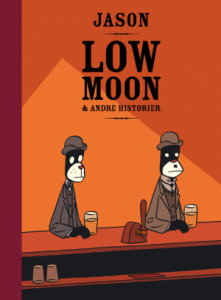 Low Moon & andre historier var også julegave, sammen med Delisle. Jeg har selvsagt lest Jason før, men bare kortere historier publisert i antologier/tegneserieblad. Jeg må vel ærlig innrømme at jeg ikke helt skjønner hva som er så stort med Jason.
Low Moon & andre historier var også julegave, sammen med Delisle. Jeg har selvsagt lest Jason før, men bare kortere historier publisert i antologier/tegneserieblad. Jeg må vel ærlig innrømme at jeg ikke helt skjønner hva som er så stort med Jason.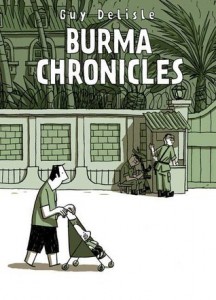
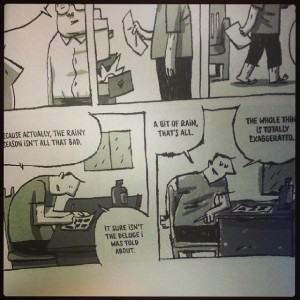


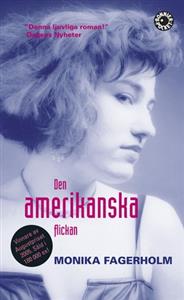
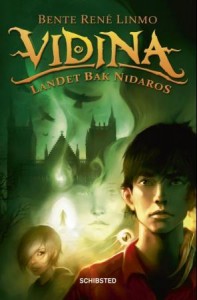
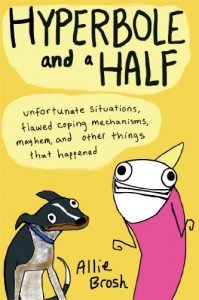 Hyperbole and a Half is a book in the category: «I have to own this NOW». When Allie Brosh announced on the
Hyperbole and a Half is a book in the category: «I have to own this NOW». When Allie Brosh announced on the 



